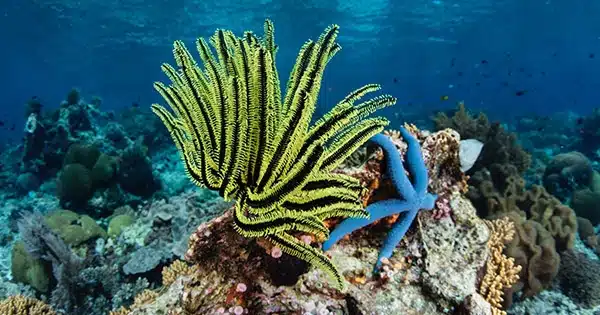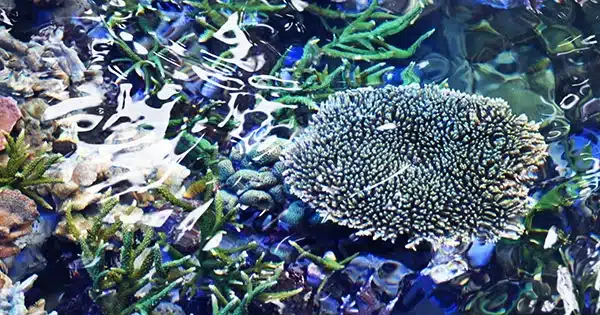The mechanisms influencing coral resilience—its ability to adapt to and survive environmental changes—appear to be more complex than scientists previously thought.
Researchers report striking discoveries regarding a species common to Caribbean seas in a paper published Oct. 17 in the journal Global Change Biology. The discovery could aid efforts to protect corals from bleaching and other effects of climate change.
A team led by USC Dornsife College of Letters, Arts, and Sciences Assistant Professor of Biological Sciences Carly Kenkel studied the mountainous star coral, Orbicella faveolata, to see if coral populations that have survived higher temperatures can pass on their heat tolerance to their offspring.
To the scientists’ surprise, the data showed the opposite: kids from a less heat-tolerant population performed better when exposed to high temperatures than offspring from a heat-tolerant population.
The findings contradict the widely believed belief among scientists that if coral parents can withstand the heat, so can their young.

Climate change poses a global threat to the existence of coral reefs. Rising ocean temperatures have caused coral bleaching, which weakens the coral and makes it more vulnerable to disease.
“The findings of the study have significant implications for how we think about saving coral reefs,” said Kenkel, the Wilford and Daris Zinsmeyer Early Career Chair in Marine Studies at USC Dornsife. “It’s not as simple as just breeding more heat-tolerant corals.”
The scientists gathered coral reproductive cells, known as gametes, from two separate coral reef sites in the Florida Keys to see which corals might withstand higher temperatures better. One is close to the coast, while the other is further out at sea.
The corals were carefully cultivated in a controlled setting, and the coral larvae were subjected to heat-stress conditions in the lab. The researchers then monitored the corals’ survival. They also looked at the activity of coral genes to determine if they could detect stress at higher temperatures.
The unexpected finding that coral larvae from the less heat-tolerant population survived better and showed fewer signs of stress suggests that coral offspring’s ability to handle heat may be influenced by a variety of factors, including whether and how frequently their parents have bleached in the past or suffered other environmental pressures.
More research is needed to confirm the researchers’ conclusions, they admit. The study focuses on a single coral species, and different species may exhibit different behaviors. Furthermore, the study was conducted in a controlled laboratory setting, and numerous factors other than temperature affect coral reefs in the wild.
The researchers seek to learn more about how corals adapt to environmental changes and pass on resilience, as well as the impact of coral history and connections with other creatures on the general health of the reef.
Kenkel, who also works at USC Dornsife’s Wrigley Institute for Environment and Sustainability, believes that coral recovery may necessitate a more holistic approach.
“Instead of focusing solely on breeding more heat-tolerant corals,” she went on to say, “we might need to consider other factors affecting coral survival and more diverse interventions.” This encompasses genetic variety as well as extrinsic stressors that affect their general well-being.
Scientists may discover new ways to help these vital ecosystems thrive in a changing world by uncovering the secrets of corals’ capacity to endure rising temperatures.
Yingqi Zhang, the study’s first author, worked on the project while a student in Kenkel’s USC Dornsife lab. She sees the work, which she is now doing at the University of Utah, as an essential step in saving reefs.
“We believe that this study opens up promising avenues for future research, which is critical to the success of reef management and restoration practices for this charismatic Caribbean coral species,” she went on to say.














